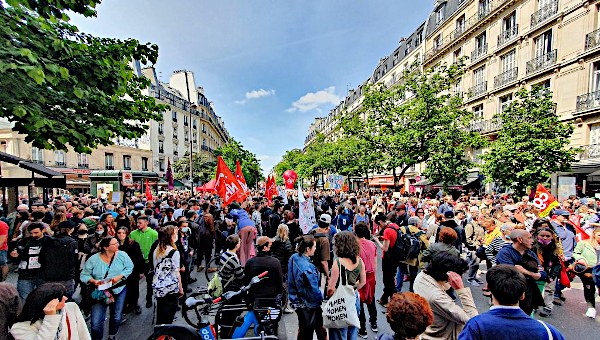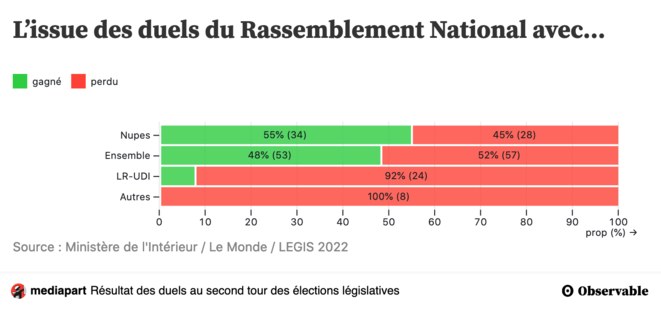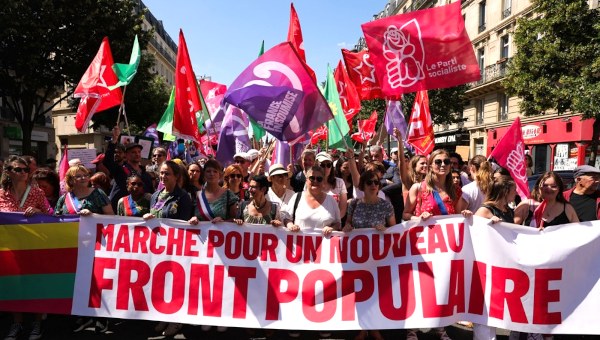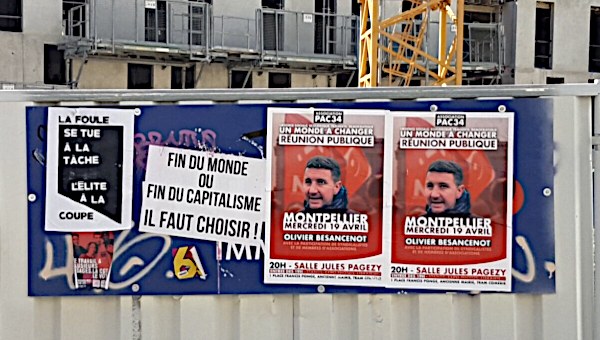French Parliamentary Elections 2022
Uncertain Future: How 2022 Parliamentary Elections Confirmed France’s Radically Different Political Landscape
The outcome of France’s legislative elections on Sunday (June 19th) shows the extent to which the country’s political map has been redrawn in recent years. There are now three main blocs and groups of voters; Emmanuel Macron’s centre-right, the Left and the far-right. But the composition of the new National Assembly, in which Macron’s coalition has the single largest bloc of MPs but lacks an overall majority, raises as many questions as answers about the political future. Fabien Escalona assesses the uncertainties that lie ahead.
There is something paradoxical about the election season that has just come to a close in France with the second round of the legislative elections on Sunday June 19th. On the one hand, a phenomenon observed in the first round of the presidential election in April has been confirmed. This is that the old parties of the past, who had dominated French politics from the start of the 1980s to the start of the 2010s, are no longer the ones vying for power at national level. Yes, the Socialist Party (PS) and the rightwing Les Républicains managed to survive the seismic shock of the 2017 elections which saw Emmanuel Macron enter the Élysée and then win a huge Parliamentary majority. But new political forces, or those that had been kept on the margins of power, now dominate the three electoral blocs – Macron’s centre-right, the leftwing NUPES alliance and the far-right – into which France is divided.
On the other hand, there are still several questions that remain unanswered about this new political map. The precise boundaries of these three electoral blocs, the balance of power within them and how they will co-exist within France’s political institutions are all likely to evolve. In the coming years, for example, there could be successors to one or all of the leaders of these three blocs – Emmanuel Macron, Jean-Luc Mélenchon and Marine Le Pen. The greatest uncertainty of all, of course, stems from the fact that, for the first time since presidential terms were cut from seven to five years two decades ago, a newly-elected president has just lost an overall majority in the National Assembly.

Cohabitations With the Right?
Florent Gougou, a lecturer at Sciences Po Grenoble university in south-east France, uses an historical analogy to assess what has just occurred. “In 1986 we went through the first of [President] François Mitterrand’s cohabitations with the Right,” he said, referring to the period in which because of the balance of power in Parliament the socialist president had to choose a prime minister from the Right. “With hindsight, it was a first step in the consolidation of an electoral order which has been ushered in by the change in 1981 [editor’s note: when Mitterrand was elected, and following which the traditional Left and Right alternated in power]. But at the time people didn’t know if this kind of situation was exceptional or was likely to happen again.”
With 246 MPs the presidential Ensemble coalition is 43 seats short of an overall majority in today’s new National Assembly. The origins for this failure lie in a drop in the Ensemble coalition vote in the first round of the election on June 12th. This in turn led to fewer face-to-face duels contested by Macronista candidates in the second round compared with 2017. They paid the price of a mediocre government election campaign but also for the pent-up anger that had built up over five years and which ended up penalising Macron less than his ’rootless’ party.
But the presidential coalition did not just have fewer candidates in the second round than five years ago; those who did go through also faced much stiffer competition from the Left in working class city centre and suburban constituencies in mainland France. Moreover, they were swept aside by sitting Les Républicains MPs who had strong local roots. Indeed, the Macron camp lost three-quarters of its head-to-head contests with candidates from the traditional Right, which now has more than 60 seats in the National Assembly. The ruling coalition also lost nearly half of its duels with candidates from the far-right Rassemblement National (RN).

Ensemble was not the only coalition to have problems when it came to a duel with the far-right. The broad left and environmental alliance NUPES (Nouvelle Union Populaire Écologique et Sociale) lost a majority of its head-to-head second round contests with the RN. “If these two groups had won their duels in the same proportions as in the old electoral world then Ensemble would not have been far from an outright majority and Jean-Luc Mélenchon would not be seeing his status as the main opposition figure disputed by the RN,” said Florent Gougou.
Yet the sociological background of abstainers – the turnout rate was very low at around 46% of registered voters – did not change markedly. In other words, the RN achieved its historic result of 89 MPs despite a voting system that has always hindered it in legislative elections and despite a pool of voters – those who did actually turn out – which was very different to its main support base. This gives an insight into the far-right’s performance and underlines just how much potential it still has in elections where there is a higher turnout.
Long-term factors have also contributed to this result. Since its revival during the presidency of President Nicolas Sarkozy the RN has continue to increase its electoral audience. The number of MPs it has now just gained reflects the particularly high score that Marine Le Pen achieved in the first round of the presidential vote in April. It is also consistent with the second round of that same election, too, when she managed to poll higher than her victorious opponent Emmanuel Macron in 158 of the country’s 577 constituencies.
The RN has become particularly strong in certain areas, with some entire départements or counties electing their MPs just from this party: the Haute-Marne and Haute-Saône in the north-east, and Aude and Pyrénées-Orientales in the south.
Crumbling Barriers Against the Far-Right
Some more short-term factors were also at play in the RN’s strong performance. “Part of the RN’s score was decided between the two rounds of voting [editor’s note: between June 12th and 19th],” said political specialist Vincent Tiberj, referring to the language used by the presidential camp, who had equated the RN and NUPES, labelling them both as “extreme.”
“The government had reused rhetoric employed by Jean-François Cope and Laurent Wauquiez [editor’s note: both from the traditional Right and now both members of Les Républicains] in the years 2000 to 2010,” said Professor Tiberj from Sciences Po Bordeaux university, who thinks Ensemble voters were thus strongly dissuaded from turning out to support NUPES candidates when they were in a head-to-head duel with a far-right candidate.
The converse is also true. Having been a major factor in the ’Republican Front’ that blocked Marine Le Pen from winning the second round of the presidential election in April, voters on the Left equally chose not to turn out in those seats where Emmanuel Macron’s Ensemble candidates were in a duel with the RN. The violence of the government’s speech against the Left – as well as the feeling that one MP either way would not change things – hardly encouraged leftwing voters to turn out to block the far right a second time.
In fact, in the many constituencies where the RN won against NUPES or Ensemble candidates there was a noticeable rise in the abstention rate and an increase in the number of spoilt or blank ballot papers, while some votes were given to the NUPES or Ensemble candidate’s opponent.
In other words, in this new tripolar political world, not only do the elites from each of the three sides speak harshly about the two others, the voters themselves often follow them down this path of polarisation. Based on an Ipsos poll carried out for the second round vote, the polling firm’s research director Mathieu Gallard said that “seven NUPES voters out of ten didn’t make a choice if the RN were present, just like seven Ensemble voters out of ten.”
In the old bipolar political world between socialists and post-Gaullists, the “parties of government fought each other but were capable of working together and in the end they showed they could agree on a certain number of things, in particular supporting neoliberal globalization,” said Florent Gougou. In a way, their voters found a form of common ground in their rejection of the RN.
Now, however, ideological and sociological differences between all the blocs are very marked and their supporters tend to see the others as enemies rather than simply as opponents. It was Vincent Tiberj who put forward this distinction, in his contribution to a collective work, to differentiate between “parties on the other side to whom the individual is opposed but with whom he accepts he shares certain values” and those that are parties of the “enemy, who is outside of what each individual defines as acceptable in terms of their standard preferences.”
We are still only speaking here of just a half of all registered voters who felt involved in this vote. Vincent Tiberj points to the discontent shown by a large section of other citizens toward politics, suggesting they could in turn one day destabilise the new political balance we have now. “With each passing generation there are more and more citizens who feel unhappy and removed from what’s going on, who are not just ’critical’,” he said. “And this won’t go away, especially if they are faced with parties who are less and less present on the ground.” If this is true, then the foundations of the new tripolarisation could themselves be somewhat “shaky.”
The Left and the Abstention Problem
The leftwing coalition is one of the groups most affected by this low turnout, as shown by Jean-Luc Mélenchon’s concern about the issue on the night of the second round. In fact, more than two thirds of voters aged 18 to 34 – who are strongly pro-NUPES when they do vote – did not show up for Sunday’s second round. NUPES also has some of its strongest support among people in mid-ranking professions and among employees, who are also more likely on average to abstain.
How can one explain this low turnout, even though this legislative election seemed far more hotly-contested than any since 2002, and when even the issue of climate change cropped up at the end thanks to what appeared to be a very “political” heatwave in which France sweltered? Once again, any short-term reason to vote was offset by more powerful longer-term trends. Anyone under the age of 34 has, ever since their adolescence or childhood, only known a system that was made more favourable for a presidential style of government in 2002. That was when legislative elections started to be held immediately after presidential ones. This reduced the parliamentary polls to a secondary status, as they effectively just rubber-stamped a parliamentary majority for the newly-elected head of state.
“I’m convinced that there’s a problem about understanding the political system, especially among young voters,” said Camille Bedock, a researcher at the French National Centre for Scientific Research (CNRS). “To position yourself in relation to the Right or Left is one thing, but there can be a kind of institutional short-sightedness among those who are only interested in the presidential election, turning the legislatives into a niche election which is only for those who are most into politics and for those taking part.”
She also adds other factors that relate to the appeal of politics or lack of it: candidates who are little-known locally and have few local roots, attempts to dramatise the stakes which failed to capture the imagination and, more broadly, the lack of quality in an election campaign which it cannot be said was the centre of media attention. On that point, noted Vincent Tiberj, the “media habits of the youngest are quite fractured, there’s a real difficulty in reaching them and getting them mobilised.”
For the Left, whose NUPES alliance enabled them to win significantly more seats than in 2017 though not more votes, the generational change is double-edged. While it is supposed to benefit the Left, it also fuels low-turnout and the RN vote (both tendencies being less common among older voters). As it is, NUPES lost the majority of its head-to-head duels in all the different configurations. It won enough to reach a level of representation in the National Assembly which is close to that which it achieved in 2002 – a time which is not much discussed on the Left, as its candidate Lionel Jospin had been knocked out in the first round of the presidential election that year. But it lost too many of these duels to enable it to threaten Ensemble and stop the latter from becoming the biggest single party. This is despite the fact that the two groups were neck-and-neck in the popular vote in the first round of the election.
You could argue that what this is really about is the unfairness of a voting system that takes place over two rounds, and that proportional representation would not distort the leftwing vote as much (nor the RN vote either). But that still leaves the difficulty of how to enlarge the Left’s base support in the existing system.
“To change the balance of power the most effective way is to impose your own themes on the agenda of electoral competitors,” said Florent Gougou. “That would allow you to turn the tables and drag some social groups away from their initial preferences.”
The Fifth Republic’s System ’Breaking Down’
In the meantime, the 2022 election season has come to an end with a sense that the government is in gridlock. The almost ’automatic’ outright Parliamentary majority that the newly-elected president has consistently won for the last 20 years was thwarted this time. The result is “one of the most representative Assemblies we’ve had for a long time” said Ipsos’s Mathieu Gallard.
The problem of this current situation is not in itself that it obliges the winning camp to reach a compromise with others. This is, after all, the norm in other European democracies and the situation has already occurred in France – a few times under the current presidential Fifth Republic established in 1958, and as a matter of course before that under previous parliamentary regimes. The problem is that since 2002 the institutional dynamic to which France’s political leaders have become accustomed has been very different.
“The Fifth Republic has changed in the sense of becoming more presidential since the 2000s,” said Camille Bedock. “But today the system is breaking down. Its initial premises, such as the fact that a two-round legislative election bars the doors of the Assembly to the far-right, no longer exist. Its sole good point, which was rock solid stability at the expense of being representative, can no longer be invoked.”
In theory, a government coalition between Ensemble and Les Républicains would be the most logical outcome of this situation. But at this stage the government does not seem ready to compromise on its political direction in order to attract the lasting support of other political groups. And ranged against them, all the other groups want to stay in opposition. “The culture of coalition and negotiation is absent from the ranks of the current political classes,” said Camille Bedock. “But the situation is also not very favourable to any agreement.”
In fact, we come back to the polarisation between the three blocs that have formed in this new electoral landscape. Even in countries which are more parliamentary in nature this kind of situation, with the emergence of new parties and a massive polarisation between the major political forces, can cause difficulties. “That’s what happened in Italy in 2013 and it required several years of a ’waiting period’ and adjustments in behaviour by the political participants for it to be resolved,” said Camille Bedock.
It remains to be seen whether France’s political leaders will themselves “adjust” their behaviour, and if the issue of institutional rules will raise its head because of the potential impasse in terms of reaching agreements. That is the uncertain dimension of the political landscape that has emerged since 2017; its full nature and internal logic will only become clear in the fullness of time.
This article first published on the Europe Solidaire website.
A Breakthrough for the French Left?
In a world heading toward more wars, economic crisis, climate catastrophe and the resurgence of the far right, any success for the left is good news. So the results of the second round of elections for the French National Assembly will have been welcomed not only in France but far beyond its frontiers.
The setback for the newly-elected president Macron is well-deserved. His first five years in power have led to growing inequality, with the poorest sections of society suffering the most; his taxation policies provoked the vigorous opposition of the gilets jaunes (yellow vests).
Macron’s rule has been marked by growing authoritarianism, and in particular by increasing use of police violence. Action against the gilets jaunes left serious injuries to demonstrators. And he has deliberately encouraged Islamophobia – under the pretext of opposing ‘jihadism’ a number of mosques have been closed down.
A few weeks ago Macron confidently expected a majority for his supporters in the National Assembly which would have enabled him to carry through his policies. Now that majority has slipped out of his grasp. His supporters have only 245 seats (out of 577), over a hundred fewer than in the previous parliament, and fewer than most of the pre-election forecasts. He will need to negotiate alliances with other political forces to get a majority in parliament, and in some cases his policies may be blocked. Macron will now be much weaker – and from the point of view of the left weak government can only be a good thing. Certainly popular mobilisations will be needed to win any reforms, but this is at least a significant shift in the balance of forces.
And the team he has built up around himself has suffered some real damage. Three ministers have lost their parliamentary seats and as a result must give up their jobs. A particularly welcome defeat was that of Christophe Castaner, who had been Interior Minister directly responsible for police violence against the gilets jaunes.
In the first round there was a very high level of abstentions; fewer than half of those entitled to vote in fact did so. Obviously this reflected a sense among many voters that elections had nothing to offer them in terms of real solutions to their problems. And it was the young and the economically deprived who were the least likely to vote. The second round turnout of 46.2% was down on the first round, and shows that the left’s campaigning failed to make sufficient impact and that over half the electorate remained indifferent to the whole process.
The gains made by the Rassemblement National [RN], the party of Marine le Pen are alarming. Eighty-nine seats – as against just eight in the previous parliament – is a massive increase. And under French election rules the RN’s result entitles it to receive 54 million euros in public funding.
The RN score is far bigger than anyone expected – perhaps twice as many seats as most forecasts predicted. It seems that when faced with a choice of Macron or the RN, many who originally voted NUPES opted for the RN, on the grounds that anything was better than Macron.
That millions of voters have endorsed a party which, despite cosmetic changes since the days of the Front National, is an openly racist organization poses a serious threat. Not every RN voter is an active racist – many may just be frustrated by Macron and the whole edifice of conventional politics. But that still leaves a huge pool of people prepared to go along with racist ideas, and who would support Islamophobic initiatives and even engage in racist violence. The left cannot afford to be complacent.
NUPES – A New Left Alliance
Yet simply denouncing and challenging the far right is not enough. It is necessary to offer an alternative, some way of responding concretely to the problems and frustrations that led people to racism in the first place. The only way to counter the RN is to build a more active left. The huge growth of the RN would be even more alarming if there were not an active left prepared to oppose it in the National Assembly and beyond.
Up to the time of the presidential election Macron saw his main rival to his right. The significance of Le Pen was not so much the danger that she might win (always unlikely though not impossible) as the fact that she – and the even more noxious Eric Zemmour – dragged the whole political debate to the right. Now Macron will have to take into account the pressure of opposition from the left as well. That will not radically shift his policies – he remains committed to neoliberalism and ruling in the interests of France’s upper classes – but it may make it more difficult for him to implement anti‑working class measures.
But the most important result has been the substantial support for NUPES – the New Popular Ecological and Social Union. After the first round of the presidential election, the left candidate Jean-Luc Mélenchon was widely criticised for not calling for a vote for Macron in order to block Le Pen. In fact he could hardly have done so when he was planning within the coming few weeks to organize an electoral alliance to oppose Macron. Nonetheless many of his supporters understandably did vote for Macron to block Le Pen.
To bring together the main components of the left – Communists, Socialists, Greens – together with his organization La France Insoumise (LFI) in an electoral alliance in which all parties agreed on a single candidate for each seat, and to do so in the few weeks between the presidential election and the National Assembly poll, was a remarkable organizational achievement. The hope that NUPES could actually get a parliamentary majority was always remote, and was perhaps merely a propaganda aim rather than a realistic target. But NUPES’s achievement in getting 131 seats is nonetheless striking and marks the beginning, if only the beginning, of a restructuring of the French left, and hopefully, the emergence of forces which can begin to challenge the corruption and injustice of French society.
It remains to be seen how the electoral bloc will develop. It is one thing to organize an electoral alliance, something quite different to function as a united bloc over five years. How coherent NUPES will be remains to be seen. Mélenchon has proposed that NUPES should form a single parliamentary group. The other parties involved in NUPES have immediately refused; each will act as an independent entity. Among the Socialist Party members elected there are some who might well ally with Macron at some point.
In an interview in Jacobin Stathis Kouvelakis (a supporter of LFI) argued that:
“the Left is the common enemy of both Macron and Le Pen. And it is a rising force, grouped around its main actor, Mélenchon and France Insoumise, which is challenging the neoliberal framework to the point of fighting for a majority in the parliamentary elections. Independently of its success, are we not close to a reconfiguration of political conflict — and perhaps a return to something more like the classic right-left conflict?”
Perhaps this is a bit over-optimistic; for the moment it would seem wise to be a little cautious.
Nonetheless it is clear that the political map of France is being redrawn. Until a few years ago French politics was dominated by two main forces – the Gaullist right and the Socialist Party. Now the Gaullists – Les Républicains – have only 64 seats, about half their previous figure. The Socialist Party collapsed to an abysmal figure of 1.8% in the presidential election; now NUPES has given it a lifeline, increasing its representation to 26 seats. But henceforth it will exist in the shadow of LFI, rather than being a major political force in its own right.
Reshaping the Left
But the most encouraging feature of the elections has been the success of LFI, to which most of the new MPs belong. (Their name is generally translated as France Unbowed, which seems a little passive. Back in the days of compulsory military service the insoumis were those who refused to turn up – ‘draft‑dodgers’. Perhaps Insubordinate France would be a better translation.)
LFI originally came from a split in the Socialist Party. It already had seventeen deputies in the old parliament, but has now increased that number to 72. It will be impossible for Macron to ignore it. LFI has a number of radical policies offering a sharp alternative to Macron. In particular it is calling for an increase in the minimum wage, lowering the retirement age to sixty and freezing prices of basic necessities. The evidence of the first round was that LFI gets its main support from the young and from the less economically prosperous.
It should also be remembered that LFI is an open organization with different currents within it. As LFI supporter John Mullen noted, various revolutionary factions flourish.
At least three small revolutionary groups, two of around a hundred members each (Gauche révolutionnaire and Révolution!) and one larger current (Ensemble Insoumis) are active inside the FI. Each of them had a stand at the August 2021 Summer School, and two of them produce independent revolutionary papers.
It is also important to be clear that LFI is not simply Mélenchon’s personal organization. Because of Mélenchon’s presidential campaign a lot of comment has focussed on him personally. The British press tend to refer to him as ‘hard left’ and ‘former Trotskyist’ (true, but a very long time ago), but there is little attempt to come to terms with what he actually stands for.
But LFI has developed a team of activists and it cannot simply be reduced to Mélenchon alone; indeed Mélenchon himself will not even be a deputy in the new parliament.
For example, among the deputies in the National Assembly is François Ruffin, a journalist and film‑maker. He helped to initiate the Nuit Debout (Up All Night) movement which involved mass occupations of public places lasting through the night in opposition to government policies.
Danièle Obono is a long-standing socialist activist and has jointly edited a selection of Trotsky’s writings on racial oppression. As a black woman she has suffered her share of attacks – one right-wing paper thought it amusing to depict her as a slave with an iron collar around her neck. But despite attacks she was re-elected in the first round in Paris.
The LFI deputies have now been joined by some new activists, notably Rachel Keke, one of the leaders of a successful two-year strike by housekeepers at an Ibis hotel in Paris. She will bring an experience of low-paid manual work and class struggle to the National Assembly – things not commonly found there.
The rise of LFI and NUPES has had a significant impact on the far left. In 2002 the far left was still dominated by the Trotskyist organizations that had grown rapidly in the aftermath of 1968. In that year’s election Trotskyist candidates got over 10%, with just short of three million votes, and there was a flood of books and articles about the Trotskyist menace.
Now the far left is noticeably weaker (just as the British far left was weakened by Corbyn’s short‑lived success). Lutte Ouvrière (LO – Workers’ Fight) made a certain impact with the six presidential campaigns of Arlette Laguiller (her best result was 5.72%). They have taken a completely negative attitude to NUPES, dismissing it as just another bourgeois electoral initiative of no interest to workers, and simply counterposing their own organization. In the first round they ran candidates in 554 constituencies – a remarkable achievement for an organization with some 8,000 members – but got just 230,000 votes, far short of their previous results. It shows that LO retains its ability to mobilise its members’ time, energy and money, but it is unlikely to achieve anything.
The Nouveau Parti Anticapitaliste (NPA) showed a more balanced approach. In principle it supported NUPES, and in most areas it campaigned publicly for it. But it considered that some of the candidates endorsed, in particular from the Socialist Party, were unworthy of support, and it ran or supported candidates against them. This meant that the NPA withdrew from NUPES. This was a principled position. although it meant that the NPA forfeited any chance of getting candidates elected as deputies or even of raising its profile significantly in the campaign. Whether the NPA is capable of any significant growth remains doubtful. It may be that the political generation of 1968 is coming to the end of the road. A new left of a different kind is required to face new problems and new challenges. Whether the LFI can become that new left remains to be seen.
Only a Beginning
While the NUPES achievement should certainly be welcomed, it is open to criticism. Mélenchon is not a revolutionary and does not claim to be one, so simply to note that he is a reformist does not get us very far. But there are certain important questions that will have to argued in the months and years ahead.
Mélenchon’s flair is for electioneering, and he has run a number of good election campaigns. But perhaps he puts too much hopes in electoral politics and what it can achieve. French capitalism remains deeply entrenched and to achieve any significant change in the position of the working class will require mobilisation and action that goes far beyond simply marking ballot papers.
Moreover, LFI is still deeply immersed in nationalism. In particular the demand that France should leave NATO, but should continue to maintain its own nuclear deterrent, is hard to take seriously. The need to develop a consistently internationalist strategy is something that will be crucial for LFI in the coming period.
Mélenchon and NUPES can expect continuing vilification from Macron and his supporters, and from the mainstream media in general. We know from the experience of Corbyn that any force that offers even a minimal challenge to the existing order of power and privilege will meet massive opposition.
Rebuilding a left that can confront the challenges of the twenty-first century will be an enormous task, and if there are hopeful and positive features in LFI, there is still a very long way to go. But the left around the world can take some encouragement from a small but real victory. As we used to say in 1968 Ce n’est qu’un début; continuons le combat. It’s only a beginning; the struggle goes on. •
This article first published on the RS21 website.





